
distilabel
Distilabel is a framework for synthetic data and AI feedback for engineers who need fast, reliable and scalable pipelines based on verified research papers.
Stars: 1881
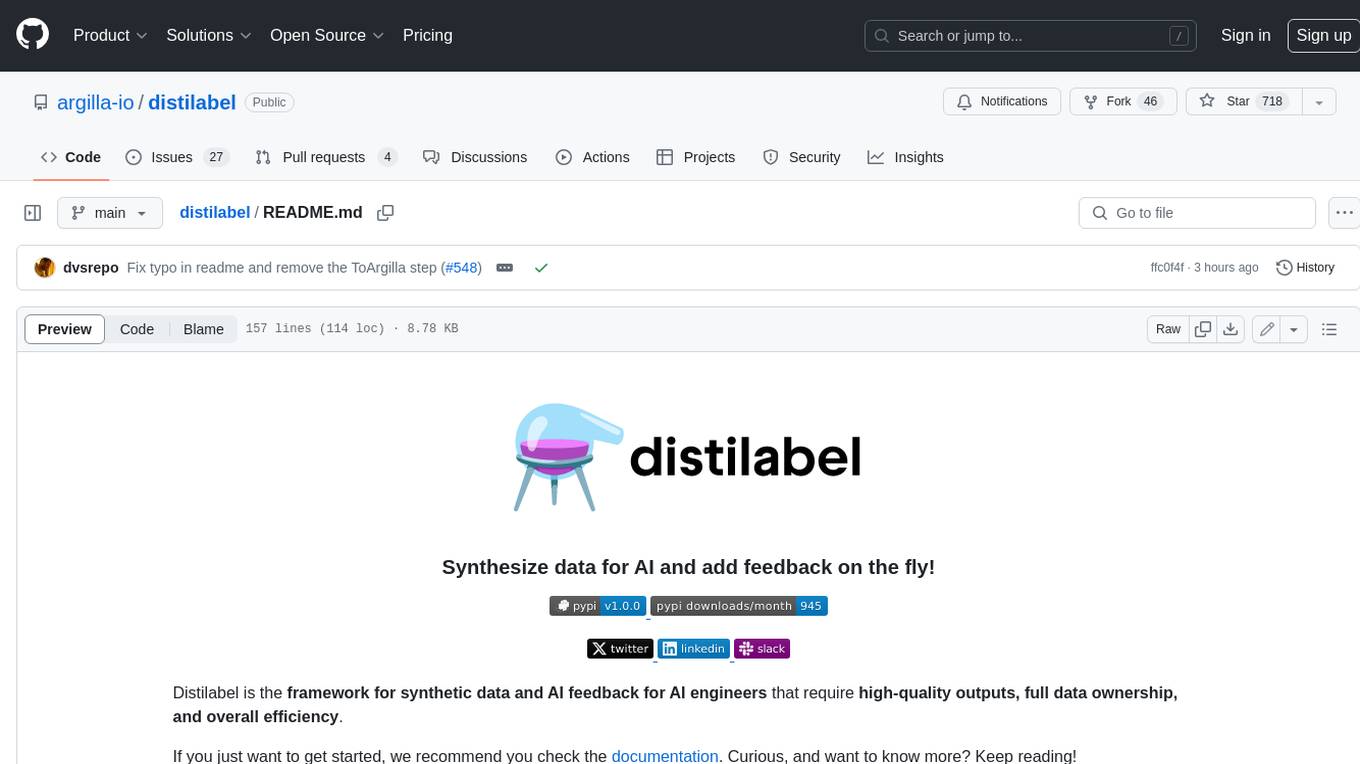
Distilabel is a framework for synthetic data and AI feedback for AI engineers that require high-quality outputs, full data ownership, and overall efficiency. It helps you synthesize data and provide AI feedback to improve the quality of your AI models. With Distilabel, you can: * **Synthesize data:** Generate synthetic data to train your AI models. This can help you to overcome the challenges of data scarcity and bias. * **Provide AI feedback:** Get feedback from AI models on your data. This can help you to identify errors and improve the quality of your data. * **Improve your AI output quality:** By using Distilabel to synthesize data and provide AI feedback, you can improve the quality of your AI models and get better results.
README:
Distilabel is the framework for synthetic data and AI feedback for engineers who need fast, reliable and scalable pipelines based on verified research papers.
If you just want to get started, we recommend you check the documentation. Curious, and want to know more? Keep reading!
Distilabel can be used for generating synthetic data and AI feedback for a wide variety of projects including traditional predictive NLP (classification, extraction, etc.), or generative and large language model scenarios (instruction following, dialogue generation, judging etc.). Distilabel's programmatic approach allows you to build scalable pipelines for data generation and AI feedback. The goal of distilabel is to accelerate your AI development by quickly generating high-quality, diverse datasets based on verified research methodologies for generating and judging with AI feedback.
Compute is expensive and output quality is important. We help you focus on data quality, which tackles the root cause of both of these problems at once. Distilabel helps you to synthesize and judge data to let you spend your valuable time achieving and keeping high-quality standards for your data.
Ownership of data for fine-tuning your own LLMs is not easy but Distilabel can help you to get started. We integrate AI feedback from any LLM provider out there using one unified API.
Synthesize and judge data with latest research papers while ensuring flexibility, scalability and fault tolerance. So you can focus on improving your data and training your models.
We are an open-source community-driven project and we love to hear from you. Here are some ways to get involved:
-
Community Meetup: listen in or present during one of our bi-weekly events.
-
Discord: get direct support from the community in #argilla-general and #argilla-help.
-
Roadmap: plans change but we love to discuss those with our community so feel encouraged to participate.
The Argilla community uses distilabel to create amazing datasets and models.
- The 1M OpenHermesPreference is a dataset of ~1 million AI preferences derived from teknium/OpenHermes-2.5. It shows how we can use Distilabel to synthesize data on an immense scale.
- Our distilabeled Intel Orca DPO dataset and the improved OpenHermes model, show how we improve model performance by filtering out 50% of the original dataset through AI feedback.
- The haiku DPO data outlines how anyone can create a dataset for a specific task and the latest research papers to improve the quality of the dataset.
pip install distilabel --upgradeRequires Python 3.9+
In addition, the following extras are available:
-
anthropic: for using models available in Anthropic API via theAnthropicLLMintegration. -
cohere: for using models available in Cohere via theCohereLLMintegration. -
argilla: for exporting the generated datasets to Argilla. -
groq: for using models available in Groq usinggroqPython client via theGroqLLMintegration. -
hf-inference-endpoints: for using the Hugging Face Inference Endpoints via theInferenceEndpointsLLMintegration. -
hf-transformers: for using models available in transformers package via theTransformersLLMintegration. -
litellm: for usingLiteLLMto call any LLM using OpenAI format via theLiteLLMintegration. -
llama-cpp: for using llama-cpp-python Python bindings forllama.cppvia theLlamaCppLLMintegration. -
mistralai: for using models available in Mistral AI API via theMistralAILLMintegration. -
ollama: for using Ollama and their available models viaOllamaLLMintegration. -
openai: for using OpenAI API models via theOpenAILLMintegration, or the rest of the integrations based on OpenAI and relying on its client asAnyscaleLLM,AzureOpenAILLM, andTogetherLLM. -
vertexai: for using Google Vertex AI proprietary models via theVertexAILLMintegration. -
vllm: for using vllm serving engine via thevLLMintegration. -
sentence-transformers: for generating sentence embeddings using sentence-transformers. -
mlx: for using MLX models via theMlxLLMintegration.
-
outlines: for using structured generation of LLMs with outlines. -
instructor: for using structured generation of LLMs with Instructor.
-
ray: for scaling and distributing a pipeline with Ray. -
faiss-cpuandfaiss-gpu: for generating sentence embeddings using faiss. -
text-clustering: for using text clustering with UMAP and Scikit-learn. -
minhash: for using minhash for duplicate detection with datasketch and nltk.
To run the following example you must install distilabel with the hf-inference-endpoints extra:
pip install "distilabel[hf-inference-endpoints]" --upgradeThen run:
from distilabel.models import InferenceEndpointsLLM
from distilabel.pipeline import Pipeline
from distilabel.steps import LoadDataFromHub
from distilabel.steps.tasks import TextGeneration
with Pipeline(
name="simple-text-generation-pipeline",
description="A simple text generation pipeline",
) as pipeline:
load_dataset = LoadDataFromHub(output_mappings={"prompt": "instruction"})
text_generation = TextGeneration(
llm=InferenceEndpointsLLM(
model_id="meta-llama/Meta-Llama-3.1-8B-Instruct",
tokenizer_id="meta-llama/Meta-Llama-3.1-8B-Instruct",
),
)
load_dataset >> text_generation
if __name__ == "__main__":
distiset = pipeline.run(
parameters={
load_dataset.name: {
"repo_id": "distilabel-internal-testing/instruction-dataset-mini",
"split": "test",
},
text_generation.name: {
"llm": {
"generation_kwargs": {
"temperature": 0.7,
"max_new_tokens": 512,
}
}
},
},
)
distiset.push_to_hub(repo_id="distilabel-example")If you build something cool with distilabel consider adding one of these badges to your dataset or model card.
[<img src="https://raw.githubusercontent.com/argilla-io/distilabel/main/docs/assets/distilabel-badge-light.png" alt="Built with Distilabel" width="200" height="32"/>](https://github.com/argilla-io/distilabel)
[<img src="https://raw.githubusercontent.com/argilla-io/distilabel/main/docs/assets/distilabel-badge-dark.png" alt="Built with Distilabel" width="200" height="32"/>](https://github.com/argilla-io/distilabel)
To directly contribute with distilabel, check our good first issues or open a new one.
@misc{distilabel-argilla-2024,
author = {Álvaro Bartolomé Del Canto and Gabriel Martín Blázquez and Agustín Piqueres Lajarín and Daniel Vila Suero},
title = {Distilabel: An AI Feedback (AIF) framework for building datasets with and for LLMs},
year = {2024},
publisher = {GitHub},
journal = {GitHub repository},
howpublished = {\url{https://github.com/argilla-io/distilabel}}
}For Tasks:
Click tags to check more tools for each tasksFor Jobs:
Alternative AI tools for distilabel
Similar Open Source Tools

distilabel
Distilabel is a framework for synthetic data and AI feedback for AI engineers that require high-quality outputs, full data ownership, and overall efficiency. It helps you synthesize data and provide AI feedback to improve the quality of your AI models. With Distilabel, you can: * **Synthesize data:** Generate synthetic data to train your AI models. This can help you to overcome the challenges of data scarcity and bias. * **Provide AI feedback:** Get feedback from AI models on your data. This can help you to identify errors and improve the quality of your data. * **Improve your AI output quality:** By using Distilabel to synthesize data and provide AI feedback, you can improve the quality of your AI models and get better results.
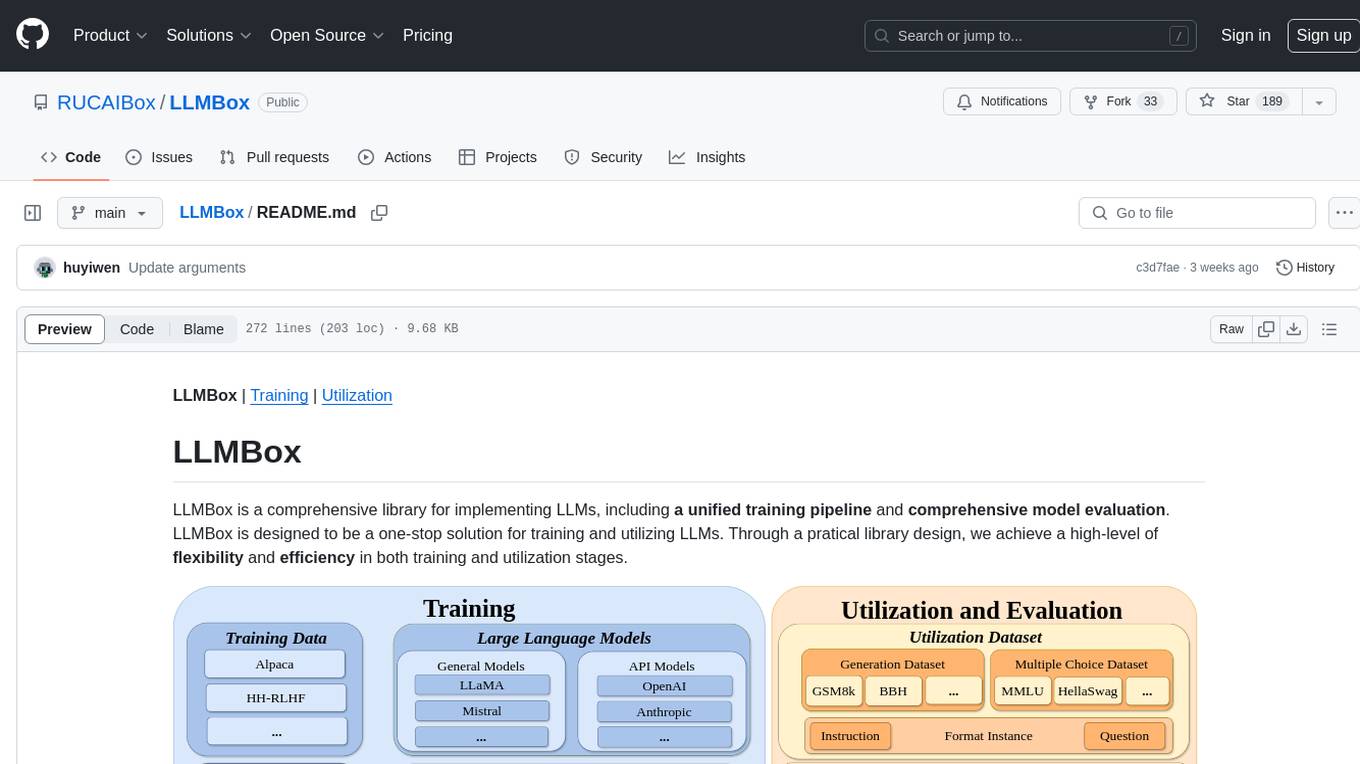
LLMBox
LLMBox is a comprehensive library designed for implementing Large Language Models (LLMs) with a focus on a unified training pipeline and comprehensive model evaluation. It serves as a one-stop solution for training and utilizing LLMs, offering flexibility and efficiency in both training and utilization stages. The library supports diverse training strategies, comprehensive datasets, tokenizer vocabulary merging, data construction strategies, parameter efficient fine-tuning, and efficient training methods. For utilization, LLMBox provides comprehensive evaluation on various datasets, in-context learning strategies, chain-of-thought evaluation, evaluation methods, prefix caching for faster inference, support for specific LLM models like vLLM and Flash Attention, and quantization options. The tool is suitable for researchers and developers working with LLMs for natural language processing tasks.

Biomni
Biomni is a general-purpose biomedical AI agent designed to autonomously execute a wide range of research tasks across diverse biomedical subfields. By integrating cutting-edge large language model (LLM) reasoning with retrieval-augmented planning and code-based execution, Biomni helps scientists dramatically enhance research productivity and generate testable hypotheses.
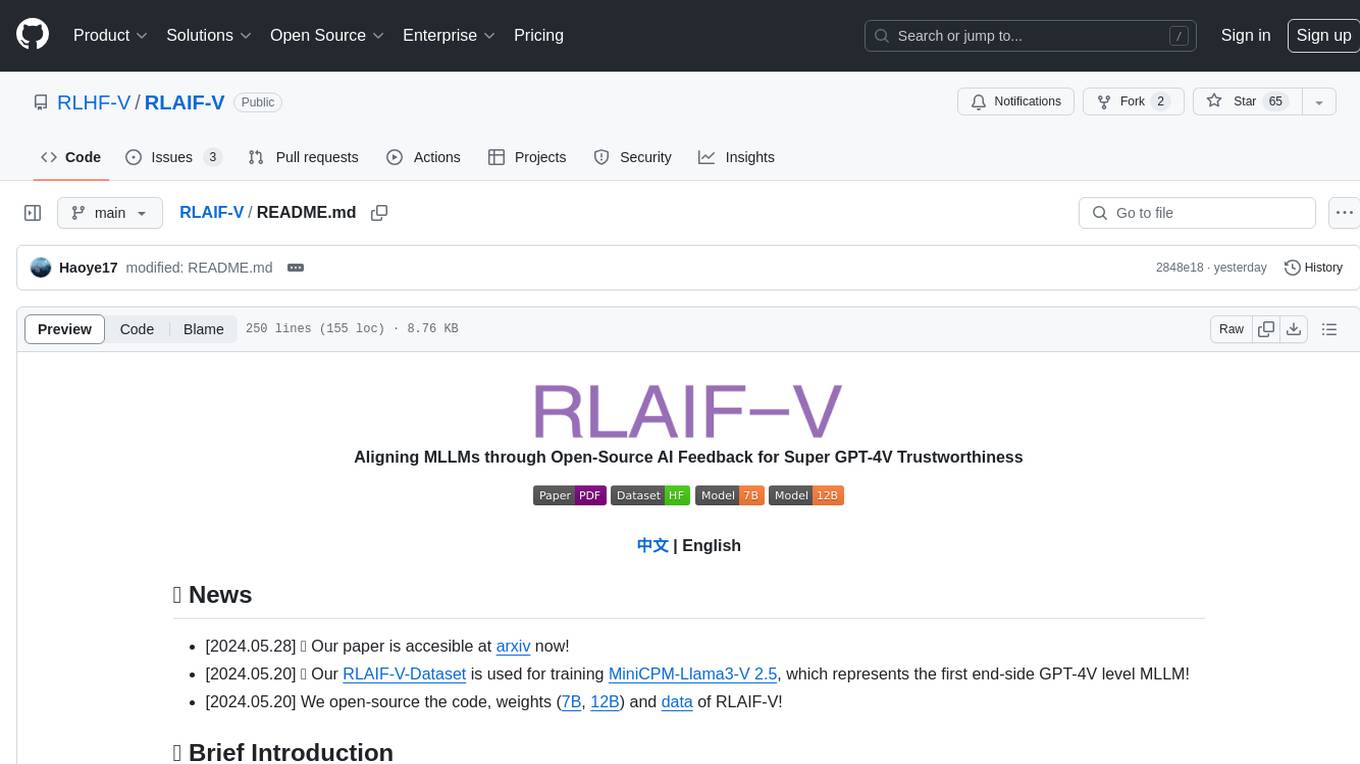
RLAIF-V
RLAIF-V is a novel framework that aligns MLLMs in a fully open-source paradigm for super GPT-4V trustworthiness. It maximally exploits open-source feedback from high-quality feedback data and online feedback learning algorithm. Notable features include achieving super GPT-4V trustworthiness in both generative and discriminative tasks, using high-quality generalizable feedback data to reduce hallucination of different MLLMs, and exhibiting better learning efficiency and higher performance through iterative alignment.
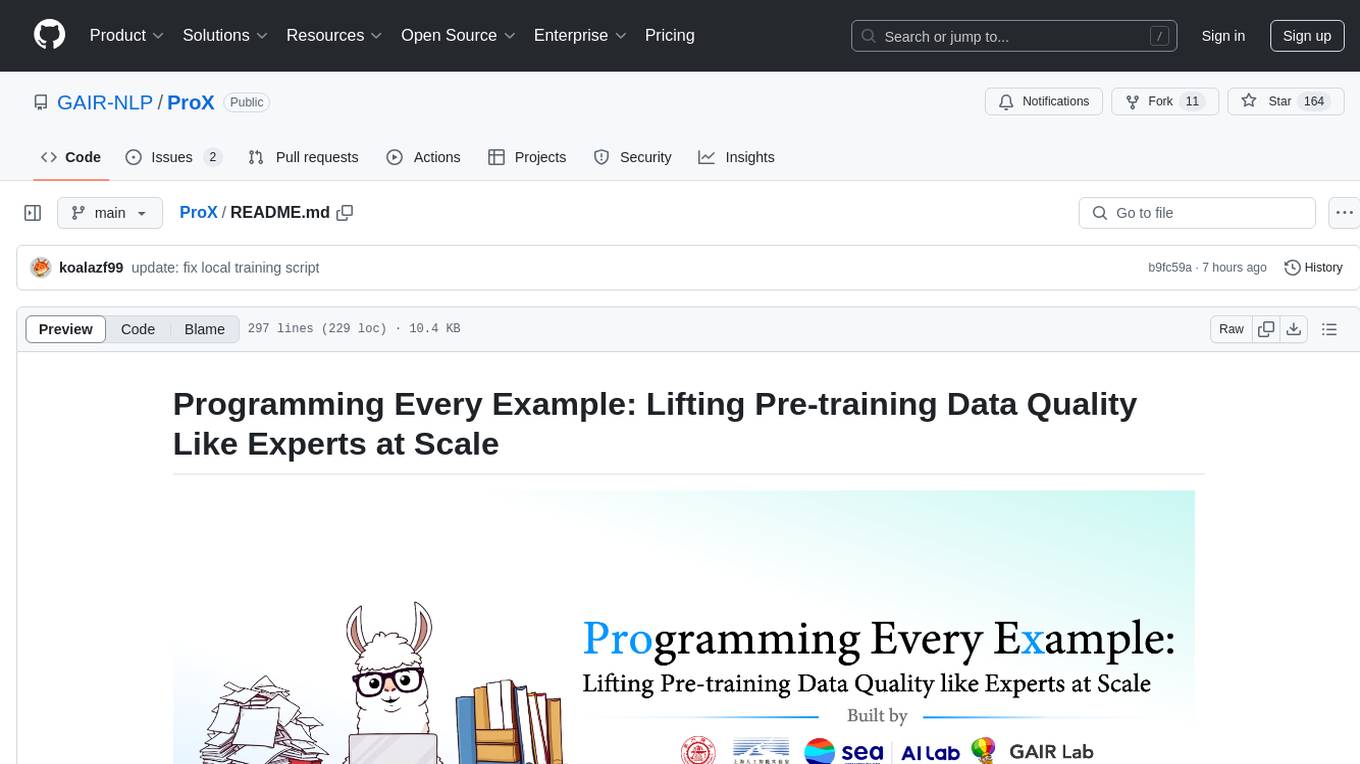
ProX
ProX is a lm-based data refinement framework that automates the process of cleaning and improving data used in pre-training large language models. It offers better performance, domain flexibility, efficiency, and cost-effectiveness compared to traditional methods. The framework has been shown to improve model performance by over 2% and boost accuracy by up to 20% in tasks like math. ProX is designed to refine data at scale without the need for manual adjustments, making it a valuable tool for data preprocessing in natural language processing tasks.
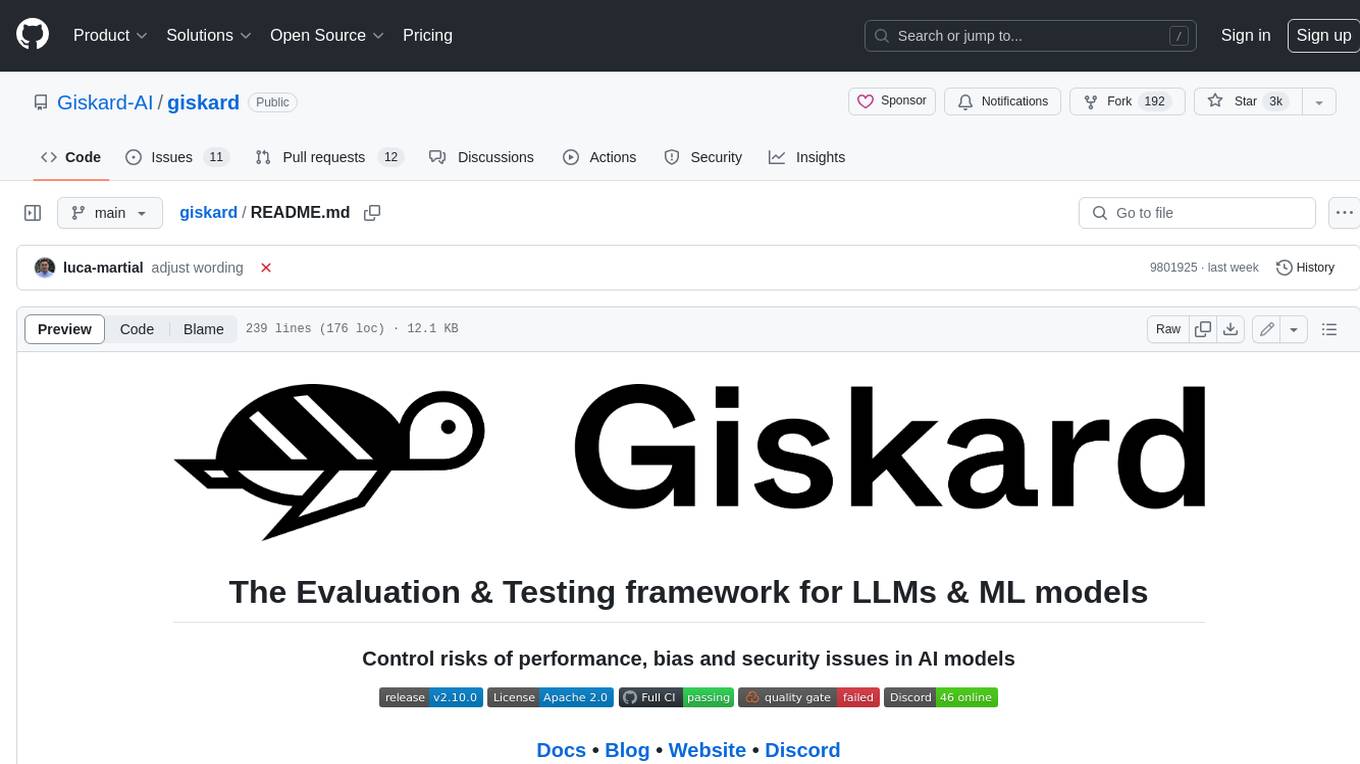
giskard
Giskard is an open-source Python library that automatically detects performance, bias & security issues in AI applications. The library covers LLM-based applications such as RAG agents, all the way to traditional ML models for tabular data.
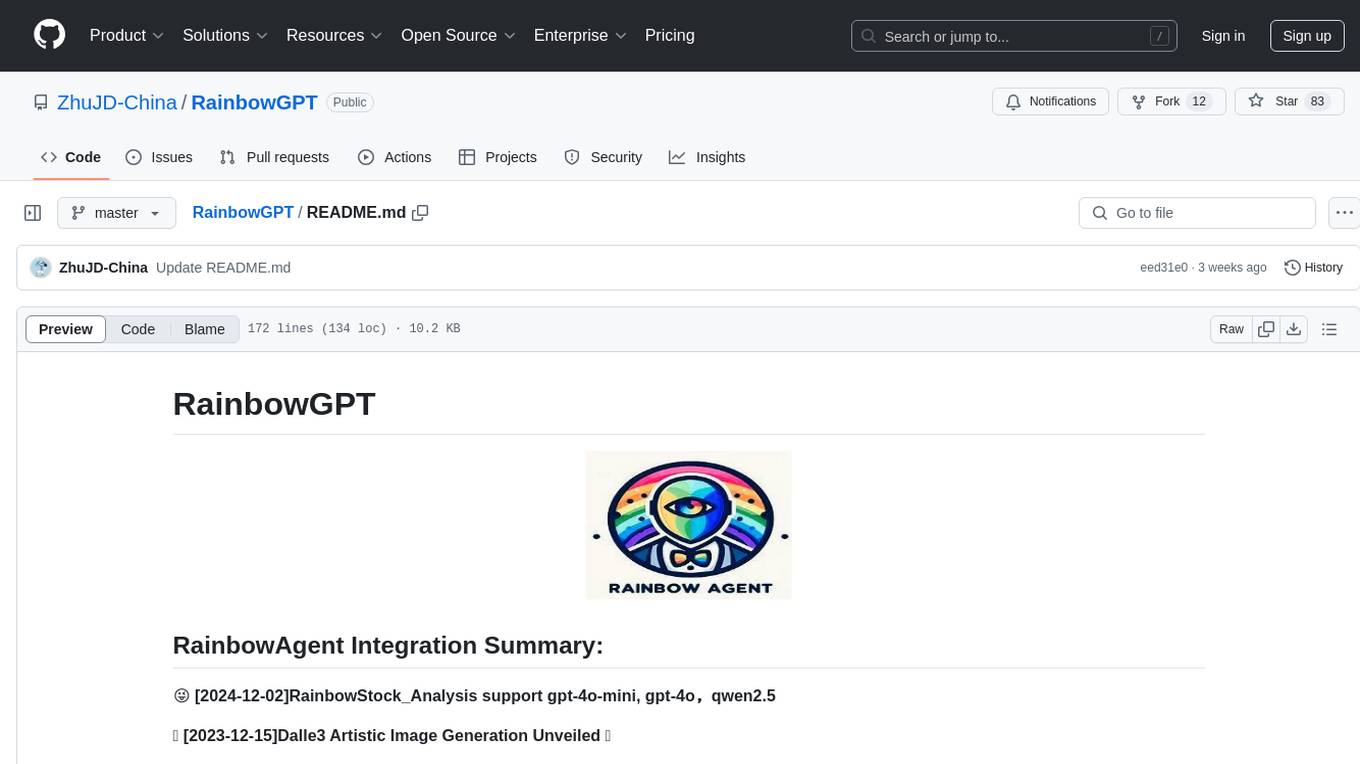
RainbowGPT
RainbowGPT is a versatile tool that offers a range of functionalities, including Stock Analysis for financial decision-making, MySQL Management for database navigation, and integration of AI technologies like GPT-4 and ChatGlm3. It provides a user-friendly interface suitable for all skill levels, ensuring seamless information flow and continuous expansion of emerging technologies. The tool enhances adaptability, creativity, and insight, making it a valuable asset for various projects and tasks.

deep-research
Deep Research is a lightning-fast tool that uses powerful AI models to generate comprehensive research reports in just a few minutes. It leverages advanced 'Thinking' and 'Task' models, combined with an internet connection, to provide fast and insightful analysis on various topics. The tool ensures privacy by processing and storing all data locally. It supports multi-platform deployment, offers support for various large language models, web search functionality, knowledge graph generation, research history preservation, local and server API support, PWA technology, multi-key payload support, multi-language support, and is built with modern technologies like Next.js and Shadcn UI. Deep Research is open-source under the MIT License.
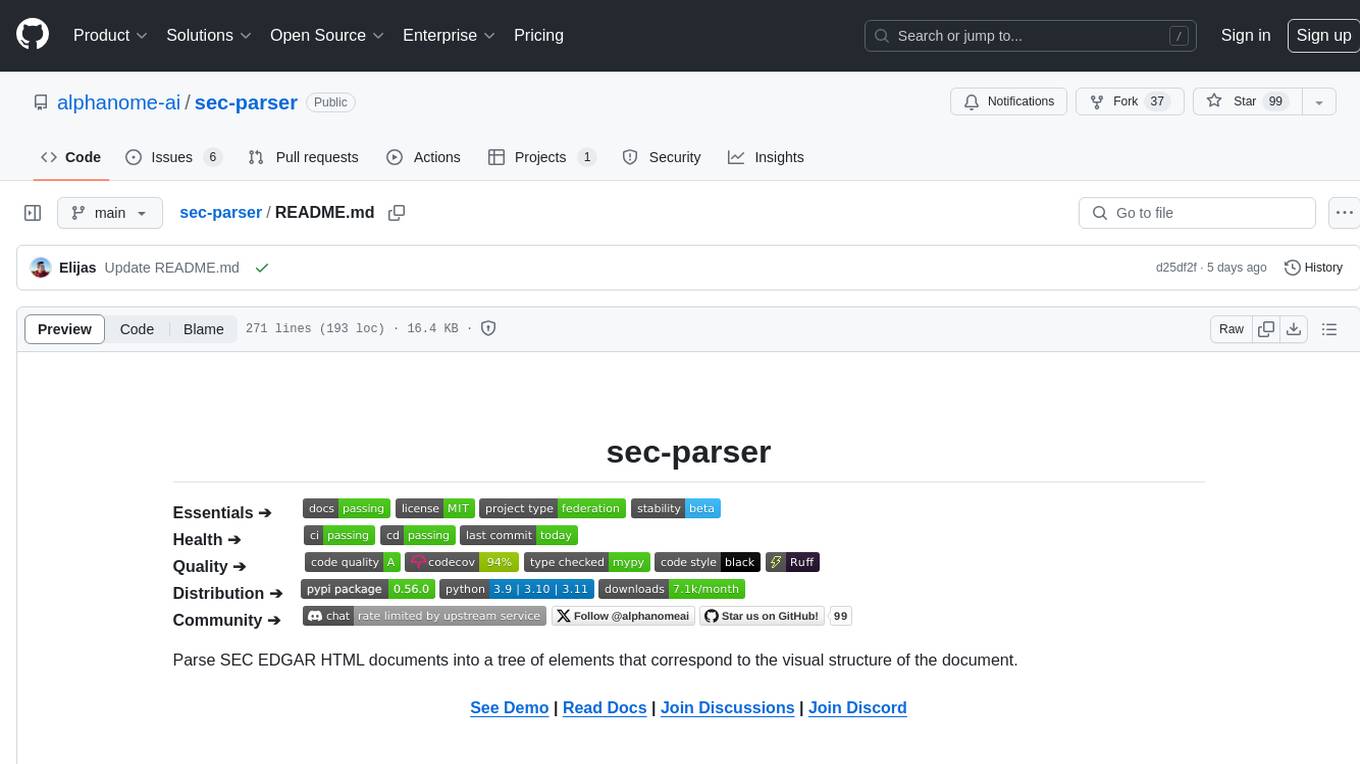
sec-parser
The `sec-parser` project simplifies extracting meaningful information from SEC EDGAR HTML documents by organizing them into semantic elements and a tree structure. It helps in parsing SEC filings for financial and regulatory analysis, analytics and data science, AI and machine learning, causal AI, and large language models. The tool is especially beneficial for AI, ML, and LLM applications by streamlining data pre-processing and feature extraction.
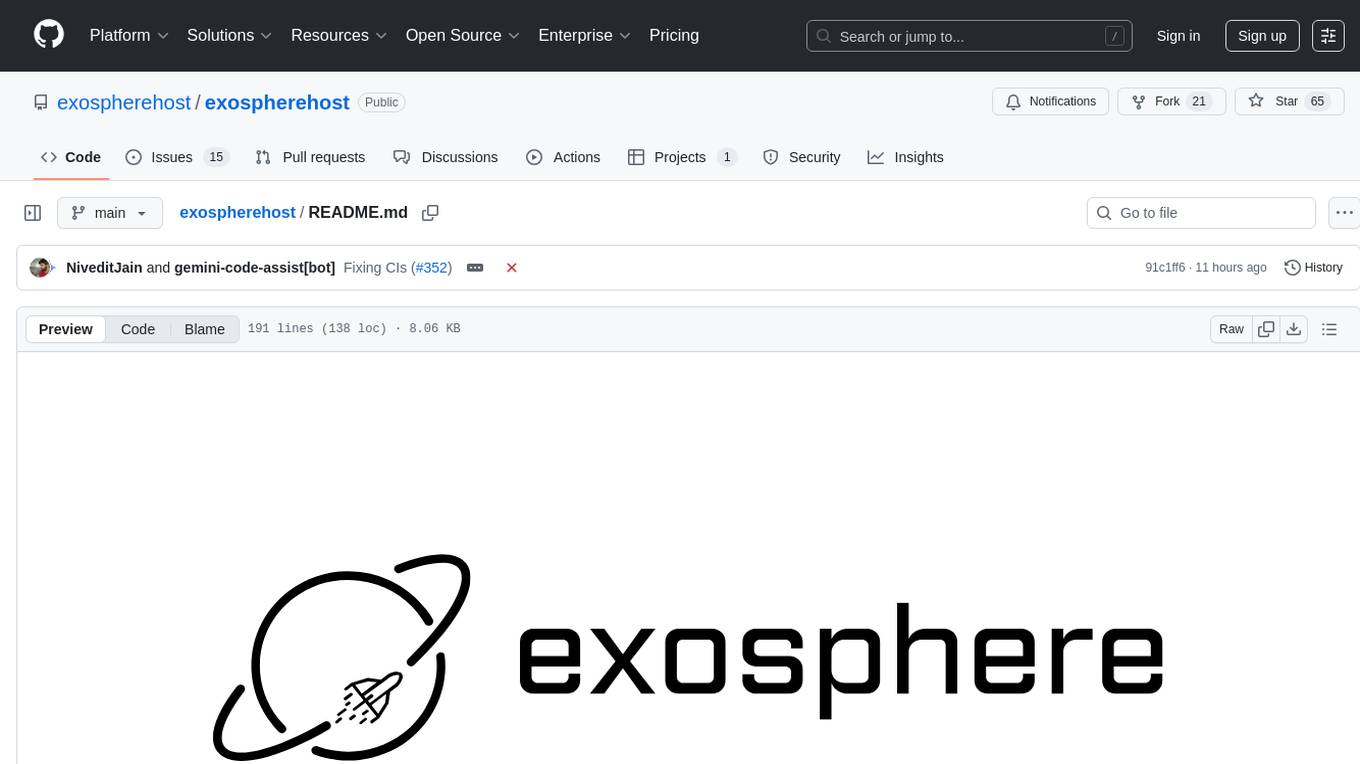
exospherehost
Exosphere is an open source infrastructure designed to run AI agents at scale for large data and long running flows. It allows developers to define plug and playable nodes that can be run on a reliable backbone in the form of a workflow, with features like dynamic state creation at runtime, infinite parallel agents, persistent state management, and failure handling. This enables the deployment of production agents that can scale beautifully to build robust autonomous AI workflows.
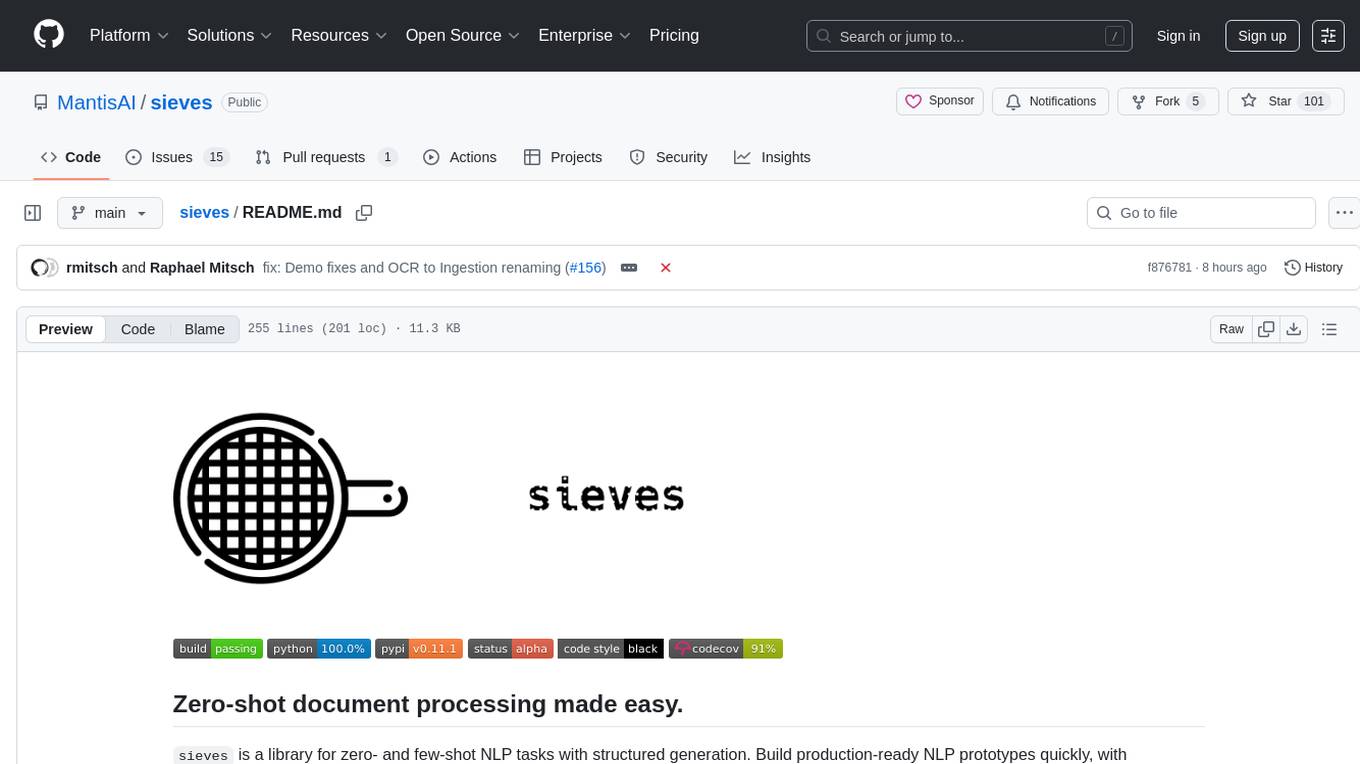
sieves
sieves is a library for zero- and few-shot NLP tasks with structured generation, enabling rapid prototyping of NLP applications without the need for training. It simplifies NLP prototyping by bundling capabilities into a single library, providing zero- and few-shot model support, a unified interface for structured generation, built-in tasks for common NLP operations, easy extendability, document-based pipeline architecture, caching to prevent redundant model calls, and more. The tool draws inspiration from spaCy and spacy-llm, offering features like immediate inference, observable pipelines, integrated tools for document parsing and text chunking, ready-to-use tasks such as classification, summarization, translation, and more, persistence for saving and loading pipelines, distillation for specialized model creation, and caching to optimize performance.
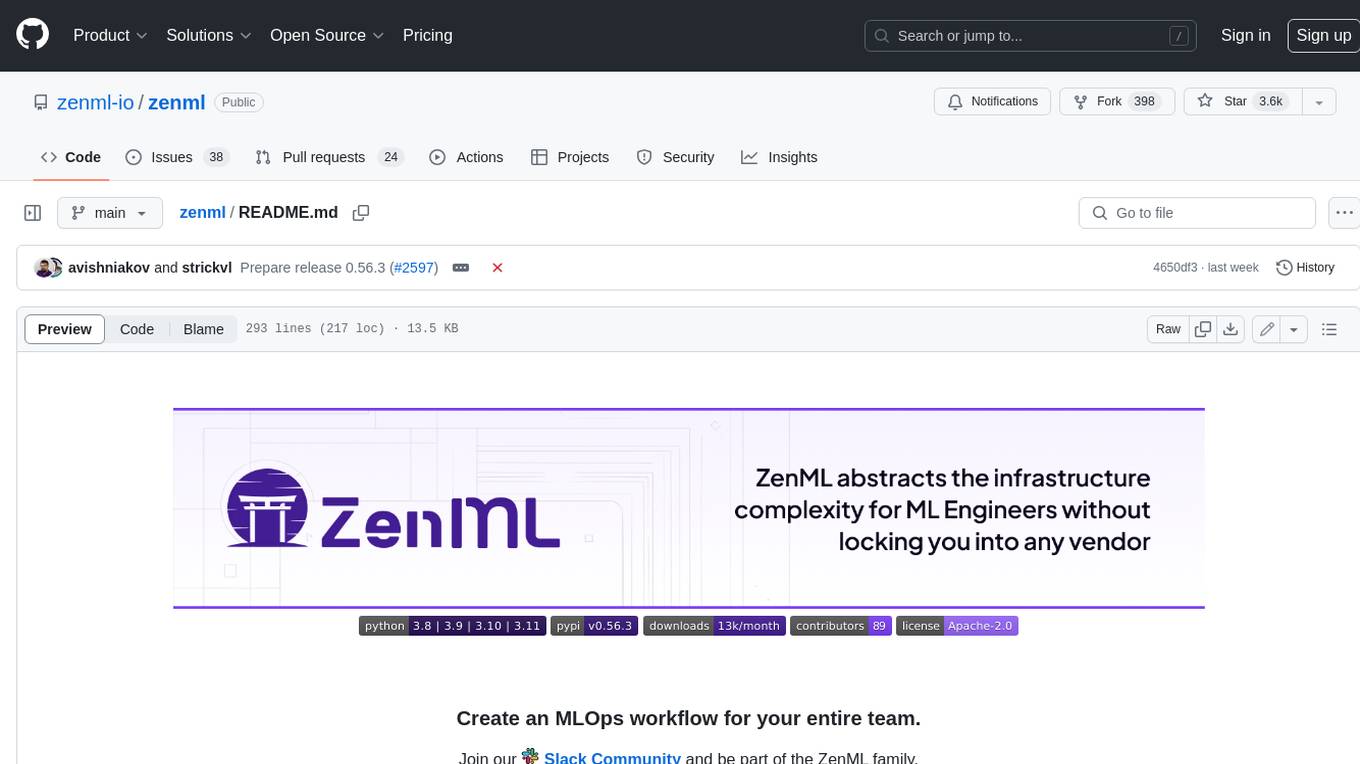
zenml
ZenML is an extensible, open-source MLOps framework for creating portable, production-ready machine learning pipelines. By decoupling infrastructure from code, ZenML enables developers across your organization to collaborate more effectively as they develop to production.
Pixel-Reasoner
Pixel Reasoner is a framework that introduces reasoning in the pixel-space for Vision-Language Models (VLMs), enabling them to directly inspect, interrogate, and infer from visual evidences. This enhances reasoning fidelity for visual tasks by equipping VLMs with visual reasoning operations like zoom-in and select-frame. The framework addresses challenges like model's imbalanced competence and reluctance to adopt pixel-space operations through a two-phase training approach involving instruction tuning and curiosity-driven reinforcement learning. With these visual operations, VLMs can interact with complex visual inputs such as images or videos to gather necessary information, leading to improved performance across visual reasoning benchmarks.

BentoML
BentoML is an open-source model serving library for building performant and scalable AI applications with Python. It comes with everything you need for serving optimization, model packaging, and production deployment.
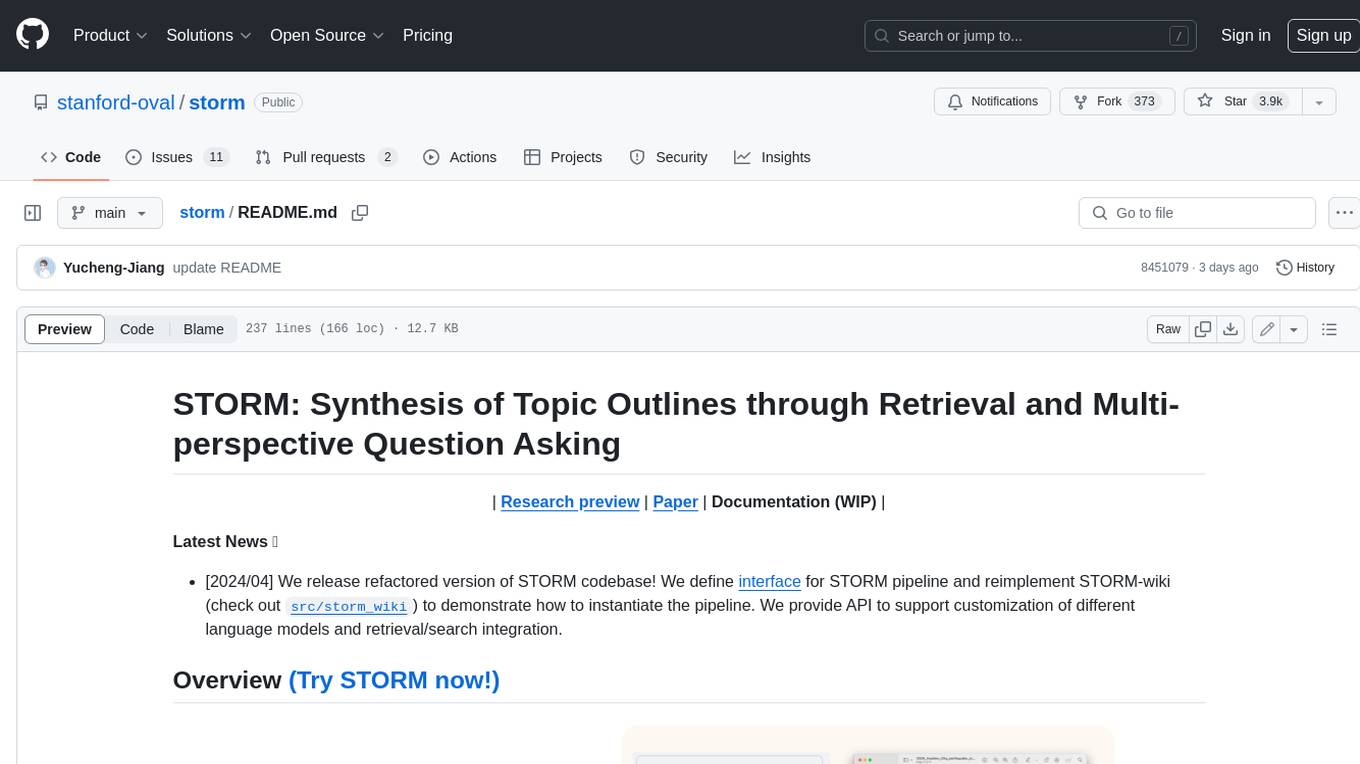
storm
STORM is a LLM system that writes Wikipedia-like articles from scratch based on Internet search. While the system cannot produce publication-ready articles that often require a significant number of edits, experienced Wikipedia editors have found it helpful in their pre-writing stage. **Try out our [live research preview](https://storm.genie.stanford.edu/) to see how STORM can help your knowledge exploration journey and please provide feedback to help us improve the system 🙏!**
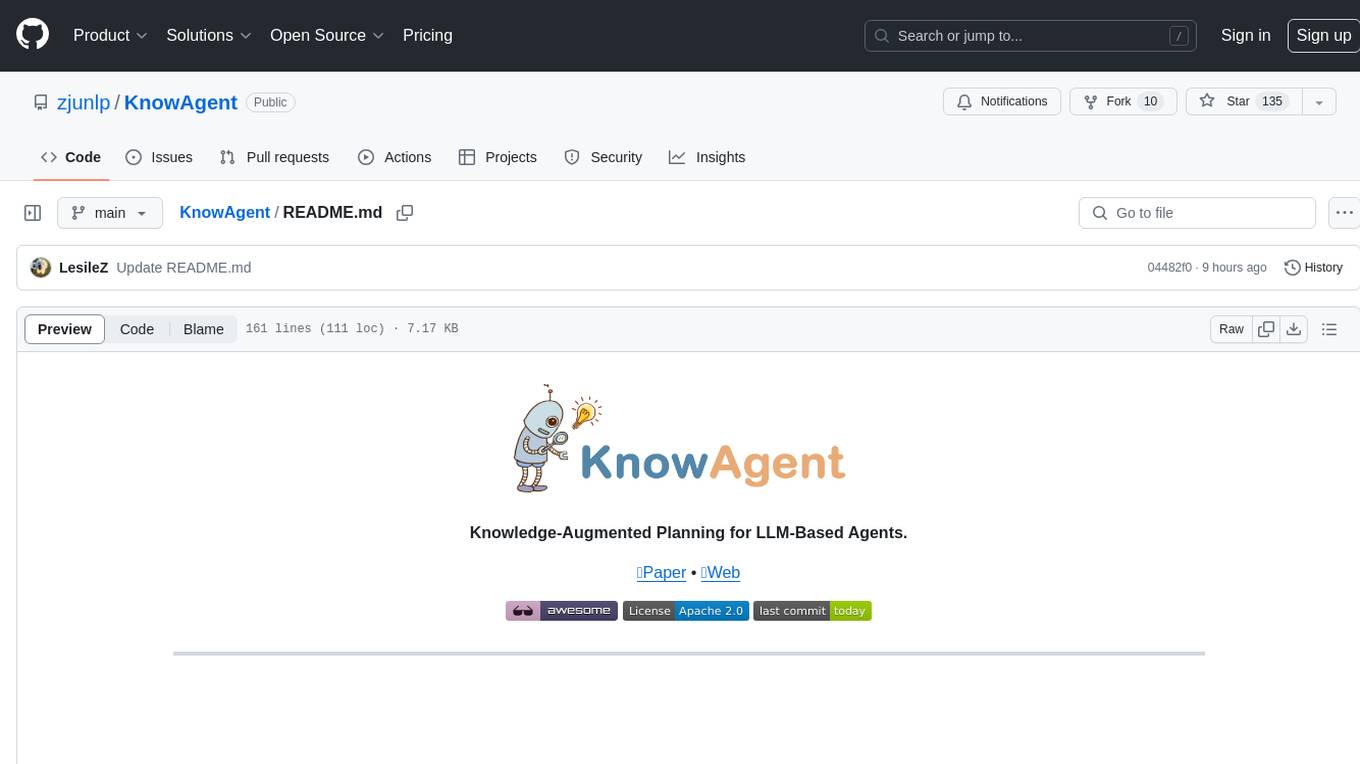
KnowAgent
KnowAgent is a tool designed for Knowledge-Augmented Planning for LLM-Based Agents. It involves creating an action knowledge base, converting action knowledge into text for model understanding, and a knowledgeable self-learning phase to continually improve the model's planning abilities. The tool aims to enhance agents' potential for application in complex situations by leveraging external reservoirs of information and iterative processes.
For similar tasks

distilabel
Distilabel is a framework for synthetic data and AI feedback for AI engineers that require high-quality outputs, full data ownership, and overall efficiency. It helps you synthesize data and provide AI feedback to improve the quality of your AI models. With Distilabel, you can: * **Synthesize data:** Generate synthetic data to train your AI models. This can help you to overcome the challenges of data scarcity and bias. * **Provide AI feedback:** Get feedback from AI models on your data. This can help you to identify errors and improve the quality of your data. * **Improve your AI output quality:** By using Distilabel to synthesize data and provide AI feedback, you can improve the quality of your AI models and get better results.
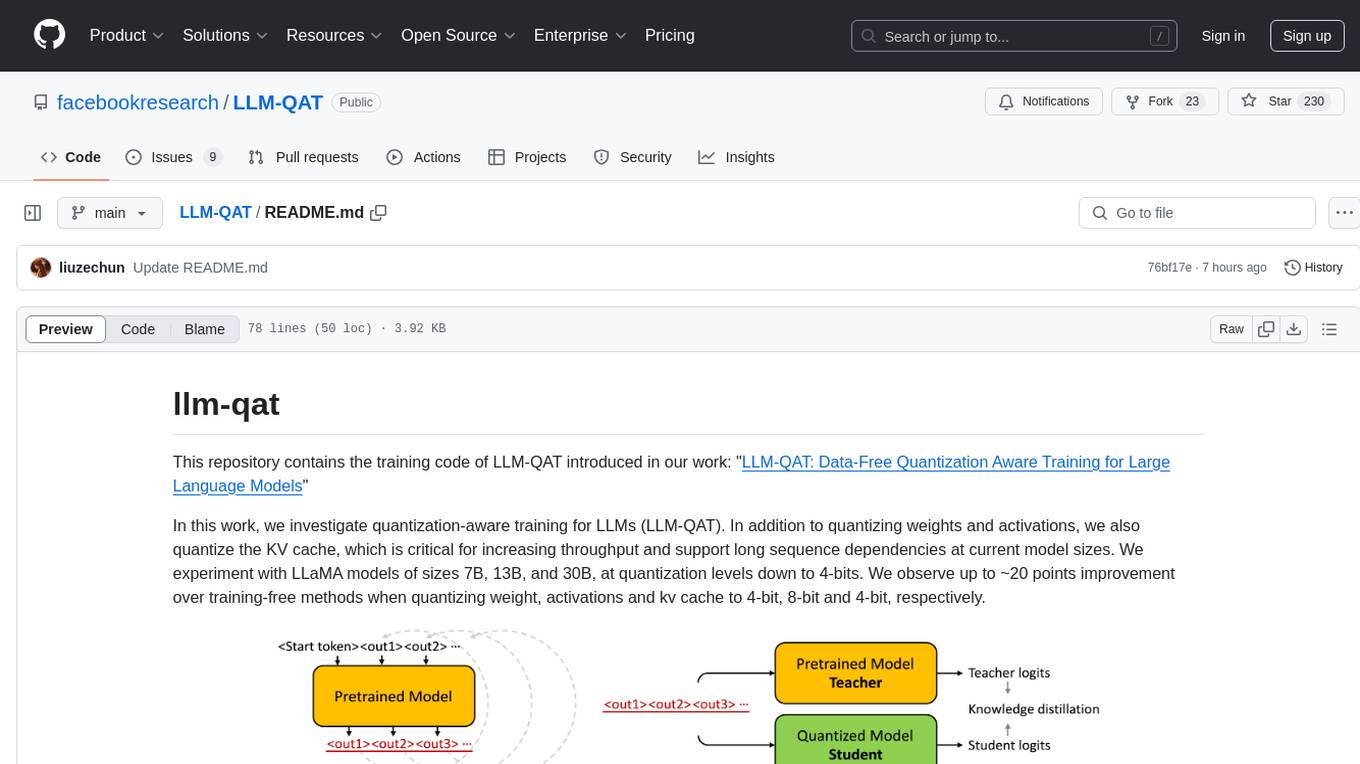
LLM-QAT
This repository contains the training code of LLM-QAT for large language models. The work investigates quantization-aware training for LLMs, including quantizing weights, activations, and the KV cache. Experiments were conducted on LLaMA models of sizes 7B, 13B, and 30B, at quantization levels down to 4-bits. Significant improvements were observed when quantizing weight, activations, and kv cache to 4-bit, 8-bit, and 4-bit, respectively.
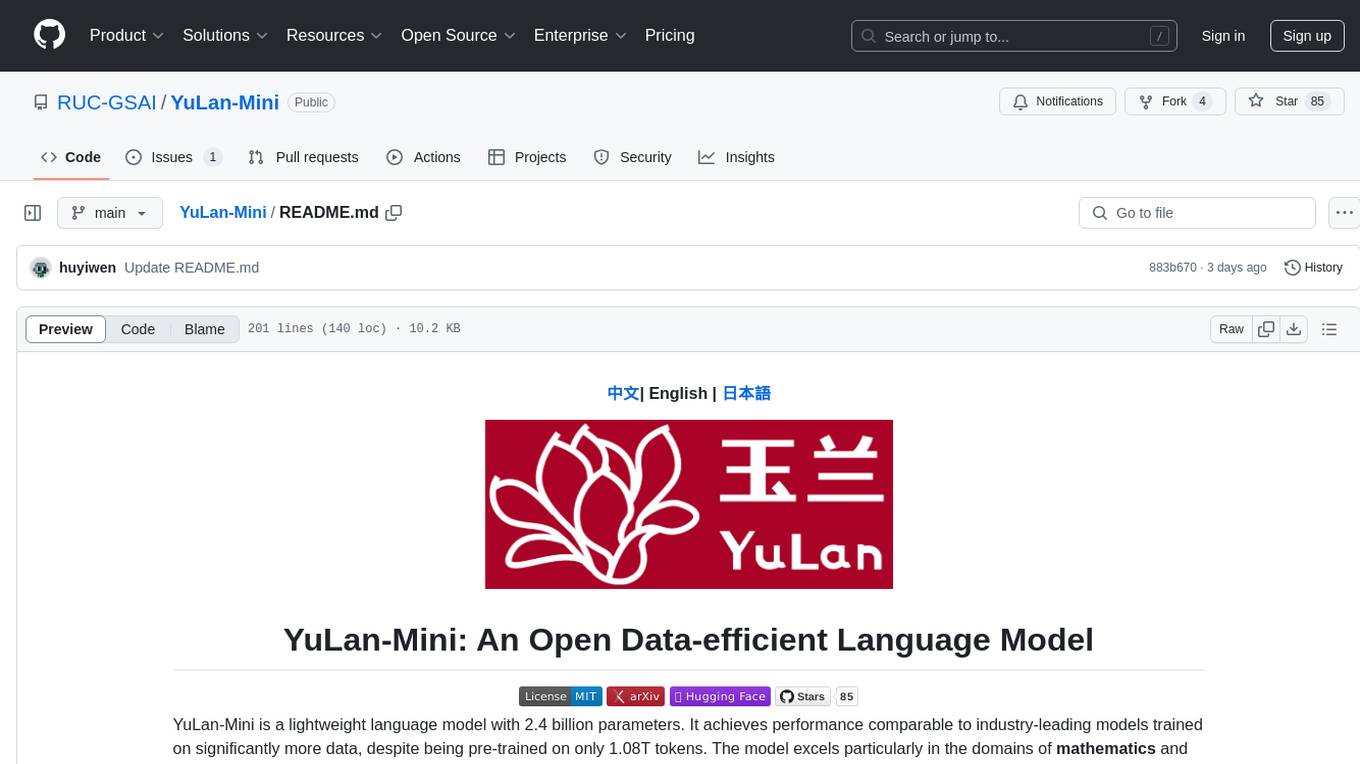
YuLan-Mini
YuLan-Mini is a lightweight language model with 2.4 billion parameters that achieves performance comparable to industry-leading models despite being pre-trained on only 1.08T tokens. It excels in mathematics and code domains. The repository provides pre-training resources, including data pipeline, optimization methods, and annealing approaches. Users can pre-train their own language models, perform learning rate annealing, fine-tune the model, research training dynamics, and synthesize data. The team behind YuLan-Mini is AI Box at Renmin University of China. The code is released under the MIT License with future updates on model weights usage policies. Users are advised on potential safety concerns and ethical use of the model.
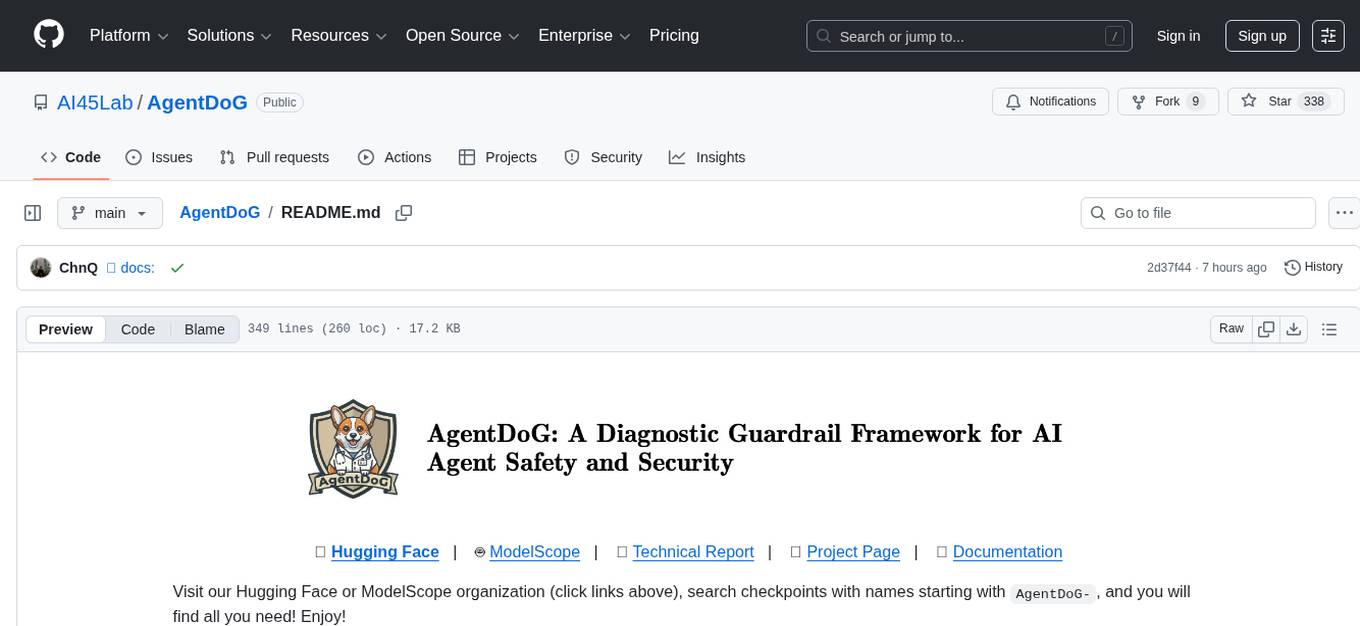
AgentDoG
AgentDoG is a risk-aware evaluation and guarding framework for autonomous agents that focuses on trajectory-level risk assessment. It analyzes the full execution trace of tool-using agents to detect risks that emerge mid-trajectory. It provides trajectory-level monitoring, taxonomy-guided diagnosis, flexible use cases, and state-of-the-art performance. The framework includes a safety taxonomy for agentic systems, a methodology for task definition, data synthesis and collection, training, and performance highlights. It also offers deployment examples, agentic XAI attribution framework, and repository structure. Customization options are available, and the project is licensed under Apache 2.0.
For similar jobs

weave
Weave is a toolkit for developing Generative AI applications, built by Weights & Biases. With Weave, you can log and debug language model inputs, outputs, and traces; build rigorous, apples-to-apples evaluations for language model use cases; and organize all the information generated across the LLM workflow, from experimentation to evaluations to production. Weave aims to bring rigor, best-practices, and composability to the inherently experimental process of developing Generative AI software, without introducing cognitive overhead.

LLMStack
LLMStack is a no-code platform for building generative AI agents, workflows, and chatbots. It allows users to connect their own data, internal tools, and GPT-powered models without any coding experience. LLMStack can be deployed to the cloud or on-premise and can be accessed via HTTP API or triggered from Slack or Discord.

VisionCraft
The VisionCraft API is a free API for using over 100 different AI models. From images to sound.

kaito
Kaito is an operator that automates the AI/ML inference model deployment in a Kubernetes cluster. It manages large model files using container images, avoids tuning deployment parameters to fit GPU hardware by providing preset configurations, auto-provisions GPU nodes based on model requirements, and hosts large model images in the public Microsoft Container Registry (MCR) if the license allows. Using Kaito, the workflow of onboarding large AI inference models in Kubernetes is largely simplified.

PyRIT
PyRIT is an open access automation framework designed to empower security professionals and ML engineers to red team foundation models and their applications. It automates AI Red Teaming tasks to allow operators to focus on more complicated and time-consuming tasks and can also identify security harms such as misuse (e.g., malware generation, jailbreaking), and privacy harms (e.g., identity theft). The goal is to allow researchers to have a baseline of how well their model and entire inference pipeline is doing against different harm categories and to be able to compare that baseline to future iterations of their model. This allows them to have empirical data on how well their model is doing today, and detect any degradation of performance based on future improvements.

tabby
Tabby is a self-hosted AI coding assistant, offering an open-source and on-premises alternative to GitHub Copilot. It boasts several key features: * Self-contained, with no need for a DBMS or cloud service. * OpenAPI interface, easy to integrate with existing infrastructure (e.g Cloud IDE). * Supports consumer-grade GPUs.

spear
SPEAR (Simulator for Photorealistic Embodied AI Research) is a powerful tool for training embodied agents. It features 300 unique virtual indoor environments with 2,566 unique rooms and 17,234 unique objects that can be manipulated individually. Each environment is designed by a professional artist and features detailed geometry, photorealistic materials, and a unique floor plan and object layout. SPEAR is implemented as Unreal Engine assets and provides an OpenAI Gym interface for interacting with the environments via Python.

Magick
Magick is a groundbreaking visual AIDE (Artificial Intelligence Development Environment) for no-code data pipelines and multimodal agents. Magick can connect to other services and comes with nodes and templates well-suited for intelligent agents, chatbots, complex reasoning systems and realistic characters.





